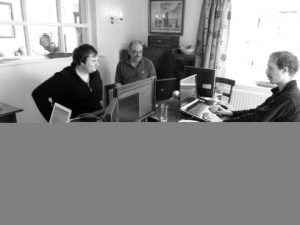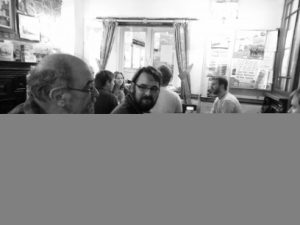Hot on the heels of our long weekend in Jersey, and right after the live deployment of Three Rings‘ Milestone: Krypton, came another trip away: I’ve spent very little time in Oxford, lately! This time around, though, it was an experimental new activity that we’ve inserted into the Three Rings calendar: Dev Training.

The format wasn’t unfamiliar: something that we’ve done before, to great success, is to take our dedicated volunteer programmers away on a “Code Week”: getting everybody together in one
place, on one network, and working 10-14 hour days, hammering out code to help streamline charity rota management. Sort-of like a LAN party, except instead of games, we do
work. The principle of Code Week is to turn volunteer developers, for a short and intense burst, in to machines that turn sugar into software. If you get enough talented people
around enough computers, with enough snacks, you can make miracles happen.

In recent years, Three Rings has expanded significantly. The test team has exploded; the support team now has to have a rota of their own in order to keep track of who’s working when; and – at long last – the development team was growing, too. New developers, we decided, needed an intensive session of hands-on training before they’d be set loose on real, production code… so we took the principles of Code Week, and turned it into a boot camp for our new volunteers!

Recruiting new developers has always been hard for us, for a couple of reasons. The first reason is that we’ve always exclusively recruited from people who use the system. The thinking is that if you’re already a volunteer at, say, a helpline or a community library or a fireboat-turned-floating-museum or any of the other organisations that use Three Rings, then you already understand why what we do is important and valuable, and why volunteer work is the key to making it all happen. That’s the bit of volunteering that’s hardest to ‘teach’, so the thinking is that by making it a prerequisite, we’re always moving in the right direction – putting volunteering first in our minds. But unfortunately, the pool of people who can program computers to a satisfactory standard is already pretty slim (and the crossover between geeks and volunteers is, perhaps, not so large as you might like)… this makes recruitment for the development team pretty hard.

A second difficulty is that Three Rings is a hard project to get involved with, as a newbie. Changing decisions in development convention, a mess of inter-related (though thankfully not inter-depedent) components, and a sprawling codebase make getting started as a developer more than a little intimidating. Couple that with all of the things our developers need to know and understand before they get started (MVC, RoR, TDD, HTML, CSS, SQL, DiD… and that’s just the acronyms!), and you’ve got a learning curve that’s close to vertical. Our efforts to integrate new developers without a formal training program had met with limited success, because almost nobody already has the exact set of skills we’re looking for: that’s how we knew it was time to make Dev Training Weekend a reality.

We’d recruited three new potential developers: Mike, Rich, and Chris. As fits our pattern, all are current or former volunteers from organisations that use Three Rings. One of them had been part of our hard-working support team for a long time, and the other two were more-new to Three Rings in general. Ruth and I ran a series of workshops covering Ruby, Rails, Test-Driven Development, Security, and so on, alternated between stretches of supervised “hands-on” programming, tackling genuine Three Rings bugs and feature requests. We felt that it was important that the new developers got the experience of making a real difference, right from the second or the third day, they’d all made commits against the trunk (under the careful review of a senior developer, of course).

We were quite pleased to discover that all three of them took a particular interest early on in different parts of the system. Of course, we made sure that each got a full and well-rounded education, but we found that they were all most-interested in different areas of the system (Comms, Stats, Rota, etc.), and different layers of development (database, business logic, user interface, etc.). It’s nice to see people enthused about the system, and it’s infectious: talking with some of these new developers about what they’d like to contribute has really helped to inspire me to take a fresh look at some of the bits that I’m responsible for, too.

It was great to be able to do this in person. The Three Rings team – now about a dozen of us in the core team, with several dozen more among our testers – is increasingly geographically disparate, and rather than face-to-face communication we spend a lot of our time talking to each other via instant messengers, email, and through the comments and commit-messages of our ticketing and source control systems! But there’s nothing quite like being able to spend a (long, hard) day sat side-by-side with a fellow coder, cracking through some infernal bug or another and talking about what you’re doing (and what you expect to achieve with it) as you go.

I didn’t personally get as much code written as I’d have liked. But I was pleased to have been able to support three new developers, who’ll go on to collectively achieve more than I ever will. It’s strange to look back at the early 2000s, when it was just me writing Three Rings (and Kit testing/documenting most of it: or, at least, distracting me with facts about Hawaii while I was trying to write the original Wiki feature!). Nowadays Three Rings is a bigger (and more-important) system than ever before, supporting tens of thousands of volunteers at hundreds of voluntary organisations spanning five time zones.
I’ve said before how much it blows my mind that what began in my bedroom over a decade ago has become so critical, and has done so much good for so many people. And it’s still true today: every time I think about it, it sends my head spinning. If that’s what it’s done in the last ten years, what’ll it do in the next ten?




